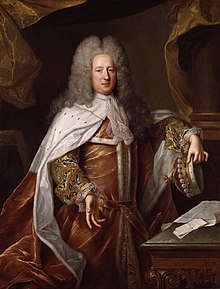Harley ministry
Amongst those writers supportive of Harley's government were Jonathan Swift, Daniel Defoe, Delarivier Manley, John Arbuthnot and Alexander Pope who clashed with members of the rival Kit-Kat Club.Ormonde took the field as commander of the British forces in Flanders in 1712, but received "restraining orders" from Harley forbidding him from committing troops to fight the French.Ormonde marched his troops away from the Allies, now commanded by Eugene of Savoy, who suffered a major defeat at the Battle of Denain without the assistance of the British.Marlborough was also dismissed from his post in the cabinet Master General of the Ordnance, a position that was handed to the Scottish Tory Duke of Hamilton.The new king, George I, was not comfortable with Harley or Bolingbroke, who he believed had opposed the Hanoverian Succession and instead supported the Jacobite pretenders.




Orford ministryRobert HarleyPrime MinisterCaptain GeneralDuke of MarlboroughMaster-General of the OrdnanceNorthernSouthern SecretaryPeace of UtrechtJacobiteQueen AnneWilliam WyndhamSecretary at WarHouse of CommonsBritishToriesWhig JuntoLord GodolphinRage of PartyJonathan SwiftDaniel DefoeDelarivier ManleyJohn ArbuthnotAlexander PopeKit-Kat ClubWar of the Spanish SuccessionTreaty of UtrechtViscount BolingbrokeNo Peace Without SpainHouse of LordsHarley's DozenRobert WalpoleprofiteeringTower of LondonLord MarlboroughDuke of OrmondeFlandersEugene of SavoyBattle of DenainMaster General of the OrdnanceDuke of HamiltonBritish Ambassador to Francenotorious duelHyde ParkLord MohunHanoverian SuccessionGeorge ITownshend ministryimpeached by ParliamentMatthew Prior1715 Jacobite rebellionSecretary of StateJames IIIEarl of MarSir William WyndhamLord TreasurerThe Earl PoulettThe Earl of OxfordThe Duke of ShrewsburyChancellor of the ExchequerRobert BensonLord President of the CouncilThe Earl of RochesterThe Duke of BuckinghamChancellor of the Duchy of LancasterThe Lord BerkeleyThe Duke of MarlboroughThe Earl RiversThe Duke of HamiltonSecretary of State for the Southern DepartmentThe Lord DartmouthThe Viscount BolingbrokeSecretary of State for the Northern DepartmentWilliam BromleyLord Privy SealThe Duke of NewcastleThe Bishop of BristolThe Earl of DartmouthFirst Lord of TradeThe Earl of StamfordThe Earl of WinchilseaThe Lord GuilfordFirst Lord of the AdmiraltyThe Earl of OrfordSir John LeakeThe Earl of StraffordGeorge GranvilleFrancis GwynTreasurer of the NavyCharles CaesarPaymaster-General of the ForcesJames BrydgesThomas MooreLord Lieutenant of IrelandThe Duke of OrmondeSecretary of State for ScotlandThe Duke of QueensberryJohn Erskine, Earl of MarPaymaster of PensionsJ. C. Sainty3rd Parliament of Great Britain4th Parliament of Great BritainGodolphin–Marlborough ministryGovernment of Great BritainBritish governmentsGreat BritainGodolphin–MarlboroughTownshendStanhope–Sunderland IStanhope–Sunderland IIWalpole–TownshendWalpoleCarteretBroad Bottom I and IIShort-livedNewcastle IPitt–Devonshire1757 CaretakerPitt–Newcastle (Newcastle II)GrenvilleRockingham IChathamGraftonRockingham IIShelburneFox–North (Portland I)